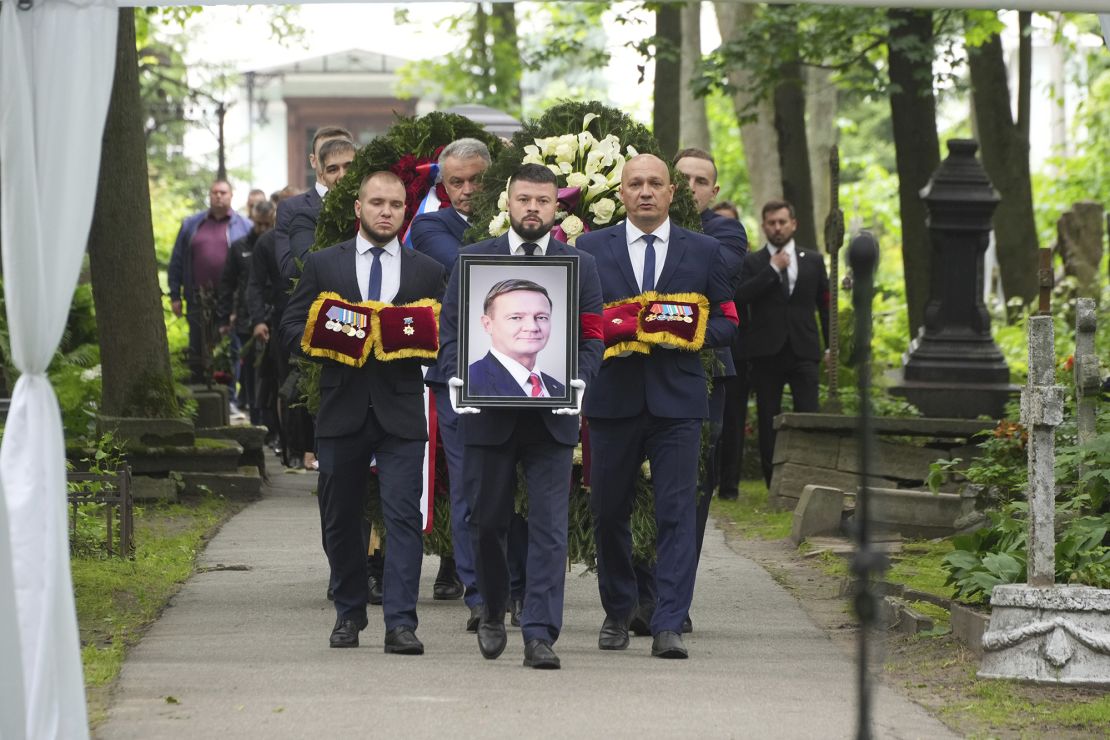CNN
—
As scattered details of the apparent suicide of Russia’s former transport minister Roman Starovoit trickled in via state media on Monday, one stood out. Near his body, the Kommersant newspaper reported, investigators found a Glock pistol that Starovoit had been given as an award.
In October 2023, in his previous job as governor of Russia’s Kursk region, Starovoit was pictured in a local news article being presented with a velvet-boxed firearm from the region’s interior ministry for his role in maintaining security there.
Fast forward 21 months and his death came amid reports he may have been doing the exact opposite. Two sources told Reuters he was suspected of being involved in a scheme to embezzle millions of dollars earmarked for border defenses. Defenses that would undoubtedly have come in useful when Ukrainian troops launched a surprise invasion there last August.
There’s no way of knowing if it was the same pistol, and it’s not clear yet if the corruption case had anything to do with his firing (no official reason was given) or his death. But the image it creates of a state-sponsored self-destruction, of a once rising star in Vladimir Putin’s political elite dead near his Tesla, with the spoils of his former loyalty, is especially poignant in today’s Russia.
More than three years into Putin’s unprovoked war on Ukraine, the Kremlin’s political vice is tightening again. Fealty to the regime is no guarantee of safety, and there are fewer places to hide from increasingly brutal consequences.
For Russians with long memories, old fears are rising.
“There’s a smell of Stalinism from this story,” wrote exiled Russian dissident Ilya Yashin on X.
And that stench is permeating beyond the halls of the transport ministry.

With Putin now settled into the second year of his fifth presidential term, the Kremlin has in recent weeks been moving to shut down any remaining threats.
In mid-June Russia’s supreme court banned the opposition “Civic Initiative” party, which had unsuccessfully attempted to field the only anti-war candidate – Boris Nadezhdin – in the 2024 presidential race. The court accused it of failing to take part in elections for seven years.
“It’s a tragic farce situation,” party leader Andrey Nechaev told supporters on Telegram last month. “First they ban us from participating in elections for fabricated reasons, then they accuse us of not participating in them,” he said.
Independent election monitoring, already on its last legs in Russia, may now also be a thing of the past. On Tuesday, Golos, Russia’s only remaining independent election watchdog, announced it was closing down.
The decision, it said, came after its co-chair Grigory Melkonyants was sentenced to five years in prison in late May, after a court found him guilty of running activities for European election monitoring network ENEMO, deemed by Russia to be an “undesirable organization.”

Golos denies the charge, but said the verdict put all its participants at risk of criminal prosecution.
The Golos case, opposition politician Vladimir Kara-Murza argues in a Washington Post op-ed, smacks of another Putin trademark: holding long-term grievances and meting out delayed retribution.
Kara-Murza believes that Golos’ original sin was not in 2024, but in documenting widespread parliamentary election violations in 2011, the year Putin announced he would return to the presidency after a brief hiatus as prime minister. The protests that followed were the biggest since the fall of the Soviet Union.
“It was a real scare for Putin, his moment of greatest weakness,” writes Kara-Murza. “And he never forgave those who, as he put it, attempted a ‘color revolution’ in Russia. This is the real reason for Grigory Melkonyants’s prison sentence.”
And it’s not just politics where the pressure is rising.
On Saturday, Konstantin Strukov, the head of Yuzhuralzoloto, one of Russia’s largest gold mining companies, was arrested while trying to leave the country on his private jet, according to Kommersant.
A few days earlier, Russia’s prosecutor general had launched a legal bid to nationalize the company, alleging Strukov had used a regional government position to acquire control of the company, among other violations.
If the post-Soviet years saw a wholesale redistribution of property away from the Russian state through rapid privatization, the Ukraine war years are characterized by the reverse.
Alexandra Prokopenko, a fellow at the Carnegie Russia Eurasia Center, calls it “the biggest redistribution of wealth in Russia in three decades.” And the purpose, she says, is “to increase loyalty to Putin.”
And there’s no attempt to mask the scent of Soviet-style control here. In March, Russia’s prosecutor general reported to Putin that companies worth 2.4 trillion rubles (over $30bn) had been transferred to the state, part of an effort “to not allow the use of private enterprises against state interests.”
Roman Starovoit’s death may have been the first suicide of a government minister in Russia (though it’s not clear if he died before or after he was fired) since the fall of the Soviet Union.
The most recent example was Gorbachev’s interior minister-turned-coup plotter Boris Pugo, who killed himself in August 1991 when his rebellion collapsed and he faced arrest. In the chaos of the early 90s, details leaked out freely about his death, his wife’s attempted suicide and even the notes they left.
The almost airtight information zone of Putin’s presidency makes it much harder to discern what exactly happened to mister Starovoit, and why.
But for Russians, it’s a graphic reminder that wealth and power carry increasing risks, as the Kremlin closes ranks for what it sees as a long-term confrontation with the West.

